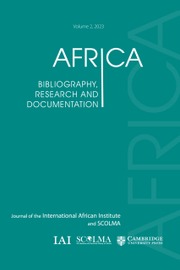David Hall, bibliographer extraordinaire, died in early 2025. He will be remembered especially for his compiling of the International Africa Bibliography (IAB), described by his SOAS Library colleague, Peter Colvin, as ‘the love of his life’ and by Hans Zell as
‘probably the most comprehensive index of Africana materials in all fields ever published … including scientific articles, particularly those in the fields of geography, natural resources, and the environment.’Footnote 1
IAB was published from 1 January 1971 to 1 December 2015 (in later years by De Gruyter) and is continued as International African Bibliography Online. The IAB helped generations of academics, students and researchers to access books and articles on all things African in an impressive range of languages. As Graham Furniss recalls, on becoming Chair of the SOAS Centre of African Studies in 1989,
not only was David trawling all the material being accessioned at SOAS Library for Africa-related content, but he was also scanning journals, whether specifically Africa related or not, for articles on aspects of Africa, and producing the International African Bibliography, a veritable treasure trove for teachers and students looking for publications on a particular subject for their essays or their research. Many a time did I send a newly arrived doctoral student from Nigeria or Namibia, Malawi or Mozambique down to the Library to ask for David Hall. Invariably, I would ask them later if David had been of any help and they would say he had spent a long time advising them on sources and possible lines to pursue and could not have been more helpful. His encyclopaedic knowledge of the resources available made him a treasure of inestimable worth to generations of students.Footnote 2
David Hall also edited the Union Catalogue of Asian Publications, 1965–1970 Footnote 3 and the Cumulative Bibliography of African Studies (1973). He later produced African Acronyms and Abbreviations (1996), Footnote 4 a quite extraordinary compilation listing an astonishing 12,000(!) acronyms and abbreviations.
Although well-liked by his colleagues and renowned for his kindness to scholars and students and, in retirement, to his neighbours in Saffron Walden, David was an intensely private individual who rarely spoke about himself. Not much is known about his early, family or home life. What follows is based largely on hearsay and reconstructed, half-remembered conversations.
He lived in London as a child and did his national service in the Army Intelligence Corps, spending most of his time monitoring the manoeuvres of Soviet Bloc aircraft from a listening post in Cyprus for the best part of two years. He studied classical languages at Oxford including, unusually, Ancient Occitan, which choice apparently pleased his tutor as he was the only one taking that subject! An excellent linguist, he won a scholarship to spend a year at the Sorbonne.
After Oxford he had a number of jobs in charity work, in particular with The Ockenden Venture, helping refugees from Hungary. He also did some charity work in Hong Kong. By the early 1960s he was working in the National Central Library. Then he came to SOAS Library, the base for the rest of his career.
For much of his time in the Library he had a large office with a great many cupboards full of catalogue cards, but also a kettle and electric stove. Over time, he moved into less and less spacious accommodation but his zeal was unabated. Few Africanist references got under his radar and he was passionate about accuracy. As Peter Colvin recalls:
He would be seen on the trail of books and articles in the Senate House Library, the British Museum as well as SOAS and other places. As a good linguist he was scrupulous in getting names of authors and titles correct and the Middle East specialist was constantly called upon to help with Arabic words and names…. He worked for long hours, and it was rumoured that he had been known to spend the night in his office when under special stress to finish the particular latest edition of his bibliography; this may be a myth but would have been typical of his hard work.Footnote 5
Outside work David would travel, although we have found no evidence that he ever visited Africa. He boasted that he had visited all the countries of Europe open to him, with the exception of Iceland. Before visiting anywhere he would learn enough of its language to conduct a conversation in the native tongue. Being ‘open to him’ meant that he could not visit Soviet Bloc countries. He used to ramble a lot and on one occasion he got into trouble by inadvertently crossing the Bulgarian border and was nearly arrested by the Bulgarian border guards after a long interview. He enjoyed and was knowledgeable about music and we are told that his favourite television programme was Fawlty Towers. He was a Harry Potter fan and collected the books in several languages.
For many years he commuted from a Cambridgeshire village. His last years were spent in a retirement flat in Saffron Walden where his neighbours found him a very courteous and generous neighbour, and recall many acts of quiet kindness.
Thanks are due to Peter Colvin, Graham Furniss and Anne Weldon, David’s neighbour and friend, for providing invaluable information for this obituary.


